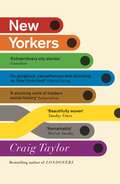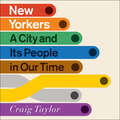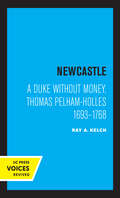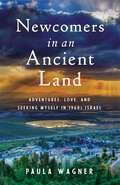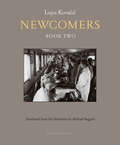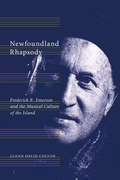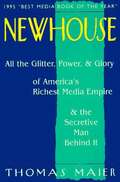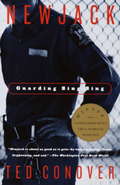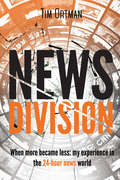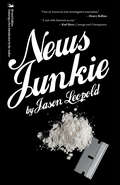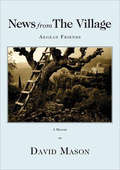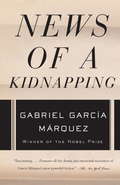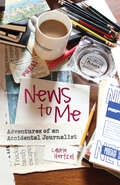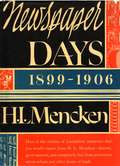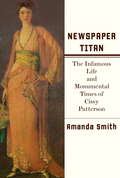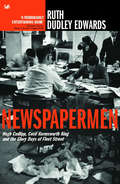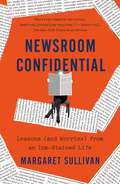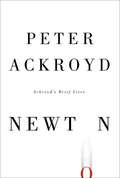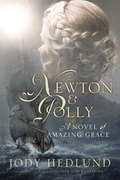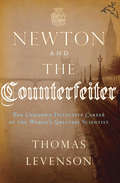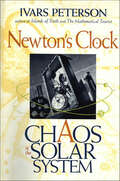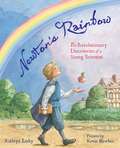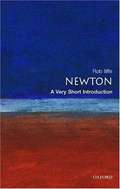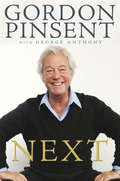- Table View
- List View
New Yorkers: A City and Its People in Our Time
by Craig Taylor'Beautifully woven' Sunday Times'Extraordinary city stories ... ambitious and entertaining ... [Taylor] does a fine job of telling the New York story' GuardianA symphony of contemporary New York told through the magnificent words of its people - from the best-selling author of Londoners.In the first twenty years of the twenty-first century, New York City has been convulsed by terrorist attack, blackout, hurricane, recession, social injustice, and pandemic. New Yorkers weaves the voices of some of the city's best talkers into an indelible portrait of New York in our time - and a powerful hymn to the vitality and resilience of its people. Vibrant and bursting with life, New Yorkers explores the nonstop hustle to make it; the pressures on new immigrants, people of colour, and the poor. It captures the strength of an irrepressible city that - no matter what it goes through - dares call itself the greatest in the world. Drawn from millions of words, hundreds of interviews, and six years in the making, New Yorkers is a grand portrait of an irrepressible city and a hymn to the vitality and resilience of its people.
New Yorkers: A City and Its People in Our Time
by Craig TaylorFrom the best-selling author of Londoners, a symphony of contemporary New York in the magnificent words of its people.TerrorBlackoutHurricane RecessionPandemicA symphony of contemporary New York told through the magnificent words of its people - from the best-selling author of Londoners.In the first twenty years of the twenty-first century, New York City has been convulsed by terrorist attack, blackout, hurricane, recession, social injustice, and pandemic. New Yorkers weaves the voices of some of the city's best talkers into an indelible portrait of New York in our time - and a powerful hymn to the vitality and resilience of its people. Vibrant and bursting with life, New Yorkers explores the nonstop hustle to make it; the pressures on new immigrants, people of colour, and the poor. It captures the strength of an irrepressible city that - no matter what it goes through - dares call itself the greatest in the world. Drawn from millions of words, hundreds of interviews, and six years in the making, New Yorkers is a grand portrait of an irrepressible city and a hymn to the vitality and resilience of its people.(P)2021 Recorded Books
Newcastle: A Duke without Money, Thomas Pelham-Holles 1693 - 1768
by Ray A. KelchThis title is part of UC Press's Voices Revived program, which commemorates University of California Press’s mission to seek out and cultivate the brightest minds and give them voice, reach, and impact. Drawing on a backlist dating to 1893, Voices Revived makes high-quality, peer-reviewed scholarship accessible once again using print-on-demand technology. This title was originally published in 1974.
Newcomers in an Ancient Land: Adventures, Love, and Seeking Myself in 1960s Israel
by Paula WagnerAt eighteen, Paula is already a seasoned traveler, having begun life in England, crisscrossed the US as a young child, and survived a year in a London boarding school, immersed in her mother&’s heritage. But when, at eighteen, she leaves home for Israel to explore her father&’s Jewish roots and learn Hebrew on a kibbutz ulpan (a work/study program on a collective farm), her quest will change her life forever. Seduced by her love of language, she continues the journey to France for several years before returning at last to settle to Israel. As she navigates her odyssey from vision to reality, she will learn much more than two new languages—and realize that if she is ever to forge her own identity, she must also separate from her twin sister and follow her own path.
Newcomers: Book Two
by Lojze KovacicThe first volume of this three-part autobiographical series begins in 1938 with the expulsion of the Kovacic family from their home of Switzerland, eventually leading to their settlement in the father's home country of Slovenia. Narrated by Kovacic as a ten-year-old boy, he describes his family's journey with uncanny naiveté. Before leaving their home, he imagines his father's home country as something beautiful out of a fairytale, but as they make their way toward exile, he and his family realize that any attempt to make a home in Slovenia will be in vain. Confronted by misery, hunger, and hostility, the young boy refuses to learn Slovenian and falls silent, his surroundings becoming a social, cultural and mental abyss. Kovačič meticulously, boldly, and sincerely portrays the objective, everyday world; the style is clear and direct. Told from the point of view of a child, one memory is interrupted by fragments and visions of another. Some are innocent and tender, while others are miserable and ruthless, resulting in a profound and heart-wrenching description of a period torn apart by conflict, reflected in the author's powerful and innovative command of language.
Newfoundland Rhapsody
by Glenn David ColtonFrederick Rennie Emerson (1895-1972) was a dynamic presence in the cultural and intellectual life of Newfoundland and Labrador for much of the twentieth century. A musician, lawyer, educator, and folklore enthusiast, Emerson was a central figure in the preservation and mediation of Newfoundland culture in the tumultuous decades prior to and following Confederation with Canada in 1949. Glenn Colton shows how Emerson fostered greater awareness and understanding of Newfoundland's cultural heritage in local, national, and international contexts. His collaboration with song collector Maud Karpeles in the late 1920s preserved some of the most cherished folk songs in the English language, and a decade later, his lectures at Memorial University College emphasized folk traditions and classical repertoire to inspire cultural discovery for an entire generation. As Newfoundland's representative on the first Canada Council and vice-president of the Canadian Folk Music Society, he played a crucial role in shaping Canadian cultural policy during the transformative years of the mid-twentieth century. Colton also reveals the meaningful creative works Emerson composed in response to the same cultural heritage he documented and preserved: his one-act drama Proud Kate Sullivan (1940) is a pioneering depiction of Newfoundland life, and the folk-inspired Newfoundland Rhapsody (1964) is one of few examples of symphonic music composed by a Newfoundlander of his generation. Newfoundland Rhapsody explores Newfoundland society, Canada's emerging arts scene, and the international folk music community to offer a new lens through which to view the cultural history of twentieth-century Newfoundland and Canada.
Newfoundland Rhapsody: Frederick R. Emerson and the Musical Culture of the Island
by Glenn David ColtonFrederick Rennie Emerson (1895-1972) was a dynamic presence in the cultural and intellectual life of Newfoundland and Labrador for much of the twentieth century. A musician, lawyer, educator, and folklore enthusiast, Emerson was a central figure in the preservation and mediation of Newfoundland culture in the tumultuous decades prior to and following Confederation with Canada in 1949. Glenn Colton shows how Emerson fostered greater awareness and understanding of Newfoundland's cultural heritage in local, national, and international contexts. His collaboration with song collector Maud Karpeles in the late 1920s preserved some of the most cherished folk songs in the English language, and a decade later, his lectures at Memorial University College emphasized folk traditions and classical repertoire to inspire cultural discovery for an entire generation. As Newfoundland's representative on the first Canada Council and vice-president of the Canadian Folk Music Society, he played a crucial role in shaping Canadian cultural policy during the transformative years of the mid-twentieth century. Colton also reveals the meaningful creative works Emerson composed in response to the same cultural heritage he documented and preserved: his one-act drama Proud Kate Sullivan (1940) is a pioneering depiction of Newfoundland life, and the folk-inspired Newfoundland Rhapsody (1964) is one of few examples of symphonic music composed by a Newfoundlander of his generation. Newfoundland Rhapsody explores Newfoundland society, Canada's emerging arts scene, and the international folk music community to offer a new lens through which to view the cultural history of twentieth-century Newfoundland and Canada.
Newhouse: All the Glitter, Power, and Glory of America's Richest Media Empire and the Secretive Man Behind It
by Thomas MaierThis book explores the history of the Newhouse family-a family that went from near poverty to amassing a media fortune of 13 billion. The Newhouse media empire includes influential magazines, book publishing houses, newspapers, and cable oulets. The book chronicles the Newhouse family story in a facinating must read style.
Newjack: Guarding Sing Sing
by Ted ConoverTed Conover, the intrepid author of Coyotes, about the world of illegal Mexican immigrants, spent a year as a prison guard at Sing Sing. Newjack, his account of that experience, is a milestone in American journalism: a book that casts new and unexpected light on this nation's prison crisis and sets a new standard for courageous, in-depth reporting. At the infamous Sing Sing, once a model prison but now New York State's most troubled maximum-security facility, Conover goes to work as a gallery officer, working shifts in which he alone must supervise scores of violent inner-city felons. He soon learns the impossibility of doing his job by the book. What should he do when he feels the hair-raising tingle that tells him a fight is about to break out? When he loses a key in a tussle? When a prisoner punches him in the head? Little by little, he learns to walk the fine line between leniency and tyranny that distinguishes a good guard. Along the way, we meet a cast of characters that includes a tough but appealing supervisor named Mama Cradle; a range of mentally ill prisoners, or "bugs"; some of the jail's more flamboyant transvestites; and a philosophical, charismatic inmate who points out to Conover that the United States is building new prisons for future felons who are now only four and five years old. Conover also gives us a history of Sing Sing (it was built by inmates, and for decades was the nation's capital of capital punishment) in a chapter that serves as a brilliant short course in America's penal system. With empathy and insight,Newjacktells the story of a harsh, hidden world and dramatizes the conflict between the necessity to isolate criminals and the dehumanization--of guards as well as inmates--that almost inevitably takes place behind bars.
News Division: When more became less: my experience in the 24-hour news world (News Memoir)
by Tim OrtmanWhat constitutes unbiased information vs. opinion disguised as facts? Why and how has what we watch become diluted, dramatized, and polarized? How have we arrived at this point? What was lost? What was gained? Through personal anecdotes, and a touch of humor, rooted in over 35 years of experience and laser-focused analysis, the author demonstrates how the television news landscape has changed and what this means for news gathering and reporting as well as for those watching at home. While the fringes on the left and the right expand, the unwavering center still delivers straightforward unbiased news, albeit packaged differently. The responsibility of discerning what we are taking in relies on us, the consumers: this book helps guide us to understand what we are being fed every day.
News Junkie
by Jason LeopoldIn News Junkie, the cutthroat worlds of journalism, politics, and high finance are laid bare by Jason Leopold, whose addictive tendencies led him from a life of drug abuse and petty crime to become an award-winning investigative journalist who exposed some of the biggest corporate and political scandals in recent American history. Leopold broke key stories about the California energy crisis and Enron Corporation's infamous phony trading floor as a reporter for the Dow Jones Newswires. While he exposed high-rolling hucksters and double-dealing politicians, Leopold hid the secrets of his own felonious past, terrified that he would be discovered. When the news junkie closed in on his biggest story - one that implicated a Bush administration member - he found himself pilloried by angry colleagues and the president's press secretary, all attempting to destroy his career. Introducing an unforgettable array of characters - from weepy editors and love-starved politicos to steroid-pumped mobsters who intimidate the author into selling drugs and stolen goods - News Junkie shows how a man once fueled by raging fear and self-hatred transforms his life, regenerated by love, sobriety, and a new, harmonious career with the independent media.
News from The Village: Aegean Friends
by David MasonA memoir of friendship, history, and longing in a Greek village that &“introduces us to a rich cast of writers and ex-pats, shepherds and urbanites&” (A.E. Stallings, Pulitzer Prize for Poetry finalist). In his twenties, an American manual laborer and poet found himself living with his beautiful wife in a village in southern Greece. Their first encounter with that country would prove an unrecoverable dream of intimate magic, but through decades of steadfast affection, David Mason grew to a deeper understanding of what it means to be a citizen of one&’s own country and a citizen of the world. From a writer praised for his &“often intoxicating language&” (Kirkus Reviews), News from the Village is a lyrical memoir of Aegean friends, including such figures as Orhan Pamuk, Bruce Chatwin, Katerina Anghelaki-Rooke, Yiorgos Chouliaras, and Patrick Leigh Fermor, each of whom comes fully alive, along with a brilliant cast of lesser-known characters. Fearing he has lost Greece and everything it has meant in his life, Mason goes back again and again to the country he knew as a young man. He encounters Turkey and Greece together in the shadow of 9/11; follows the lives of his friends, whose trials sometimes surpass his own; and brings them all together in the circle of this generous narrative. Ultimately, Mason&’s memoir is about what we can hold and what slips away, what sustains us all through our griefs and disappointments. &“Mason realizes he must confront shifting politics, village tensions, family tragedy, and history with blood on its hands before he can love Greece as she is rather than as he would have her be. Along the way, he introduces us to a rich cast of writers and ex-pats, shepherds and urbanites—and travels that stretch from the Rockies to the Bosphorus—the journey of a lifetime.&”—A.E. Stallings, Pulitzer Prize finalist and author of Like
News of a Kidnapping
by Gabriel García Márquez Edith GrossmanAVAILABLE FOR THE FIRST TIME IN eBOOK!In 1990, fearing extradition to the United States, Pablo Escobar - head of the Medellín drug cartel - kidnapped ten notable Colombians to use as bargaining chips. With the eye of a poet, García Márquez describes the survivors' perilous ordeal and the bizarre drama of the negotiations for their release. He also depicts the keening ache of Colombia after nearly forty years of rebel uprisings, right-wing death squads, currency collapse and narco-democracy. With cinematic intensity, breathtaking language and journalistic rigor, García Márquez evokes the sickness that inflicts his beloved country and how it penetrates every strata of society, from the lowliest peasant to the President himself.
News to Me: Adventures of an Accidental Journalist
by Laurie HertzelLaurie Hertzel wasn't yet a teenager in Duluth, Minnesota, when she started her first newspaper, which she appropriately christened Newspaper. Complete with the most sensational headlines of the day-MARGO FLUEGEL HAS ANOTHER BIRTHDAY!-and with healthy competition from her little brothers and their rival publication, Magapaper (a magazine and a newspaper), this venture would become Hertzel's first step toward realizing what her heart was already set on: journalism as her future.News to Me is the adventurous story of Hertzel's journey into the bustling world of print journalism in the mid-1970s, a time when copy was still banged out on typewriters by chain-smoking men in fedoras and everybody read the paper. A coming-of-age tale in more ways than one, Hertzel's eighteen-year career at the Duluth News Tribune began when journalism was a predominantly male profession. And while the newspaper trade was booming, Duluth had fallen on difficult times as factories closed and more and more people moved away. Hertzel describes her climb up the ranks of the paper against the backdrop of a Midwestern city during a time of extraordinary change. She was there during major events like the Congdon murders, the establishment of the BWCA, and the rise of Indian treaty rights, and eventually follows the biggest story of her life to Soviet Russia-and completely blows her deadline.Written with the insight and humor of someone who makes a living telling stories, News to Me is the chronicle of a small-city newspaper on the cusp of transformation, an affectionate portrait of Duluth and its people, and the account of a talented, persistent journalist who witnessed it all and was changing right along with it-whether she wanted to or not.(Oh, Newspaper doggedly outlasted the full-color Magapaper).
Newspaper Days: 1899-1906 (H.L. Mencken's Autobiography)
by H. L. MenckenOriginally published: New York: Knopf, 1941.
Newspaper Titan: The Infamous Life and Monumental Times of Cissy Patterson
by Amanda SmithThe galvanizing story of Eleanor Medill (Cissy) Patterson, celebrated debutante and socialte, scion of the Chicago Tribune empire, and the twentieth century's first woman editor in chief and publisher of a major metropolitan daily newspaper, the Washington Times-Herald. She was called the most powerful woman in America, surpassing Eleanor Roosevelt, Bess Truman, Clare Boothe Luce, and Dorothy Schiff.Cissy Patterson was from old Republican stock. Her grandfather was Joseph Medill, firebrand abolitionist, mayor of Chicago, editor in chief and principal owner of the Chicago Tribune, and one of the founders of the Republican Party who delivered the crucial Ohio delegation to Abraham Lincoln at the convention of 1860.Cissy Patterson's brother, Joe Medill Patterson, started the New York Daily News.Her pedigree notwithstanding, Cissy Patterson came to publishing shortly before her forty-ninth birthday, in 1930, with almost no practical journalistic or editorial experience and a life out of the pages of Edith Wharton (or more likely the other way around: shades of Cissy are everywhere in the Countess Olenska). Amanda Smith writes that in the summer of 1930, Cissy Patterson, educated at the turn of the century at Miss Porter's School in Farmington, Connecticut, for a vocation of marriage and motherhood and a place in society, took over William Randolph Hearst's foundering Washington Herald and began to learn what others believed she could never grasp--how to run and build up a newspaper. She vividly lived out the Medill family's editorial motto (at least in spirit): "When you grandmother gets raped, put it on the front page."Patterson soon bought from Hearst the Herald's evening sister paper, the Washington Times, merged the two, and became editor, publisher, and sole proprietor of a big-city newspaper, a position almost unprecedented in American history. The effect of the merger was "electric"...By 1945, the Washington Times-Herald, with ten daily editions, was clearing an annual profit of more than $1 million.Amanda Smith, in this huge, fascinating biography gives us the (infamous) life and monumental times of Cissy Patterson, scourge of liberals, advocate of appeasing Hitler, lover of poodles, and hater of FDR.Here is her twentieth-century Washington: its politics and society, scandals and feuds, and at the center--the fierce newspaper wars that consumed and drove the country's press titans, as Patterson took the Washington Times-Herald from a chronic tail-ender in circulation and advertising, ranked fifth in the town, and made it into the most widely read round-the-clock daily in the national's capital, deemed by many to be "the damndest newspaper to ever hit the streets."
Newspapermen: Hugh Cudlipp, Cecil Harmsworth King and the Glory Days of Fleet Street
by Ruth Dudley EdwardsThey were 'Cudlipp' and 'Mr King' when they met in 1935. At 21, gregarious, extrovert and irreverent Hugh Cudlipp had many years of journalistic experience: at 34, shy, introspective and solemn Cecil Harmsworth King, haunted by the ghost of Uncle Alfred, Lord Northcliffe, the great press magnate, and bitter towards Uncle Harold, Lord Rothermere of the Daily Mail, was fighting his way up in the family business. Opposites in most respects, they were complementary in talents and had in common a deep concern for the underdog. Cudlipp, the journalistic genius, and King, the formidable intellect, were to become, in Cudlipp's words, 'the Barnum and Bailey' of Fleet Street. Together, on the foundation of the populist Daily Mirror, they created the biggest publishing empire in the world. Yet their relationship foundered sensationally in 1968, when - as King tried to topple the Prime Minister - Cudlipp toppled King. Through the story of two extraordinary men, Ruth Dudley Edwards gives us a riveting portrait of Fleet Street in its heyday.
Newsroom Confidential: Lessons (and Worries) from an Ink-Stained Life
by Margaret Sullivan"Sullivan remains the critic American journalism requires, a veteran practitioner with street cred, still in touch with the ‘unaccountable joy’ of reporting and writing that continues to draw talented young people to the field.” —Steve Coll, The New York Times Book ReviewSullivan began her career at the Buffalo News, where she rose from summer intern to editor in chief. In Newsroom Confidential she chronicles her years in the trenches battling sexism and throwing elbows in a highly competitive newsroom. In 2012, Sullivan was appointed the public editor of The New York Times, the first woman to hold that important role. She was in the unique position of acting on behalf of readers to weigh the actions and reporting of the paper's staff, parsing potential lapses in judgment, unethical practices, and thorny journalistic issues. Sullivan recounts how she navigated the paper’s controversies, from Hillary Clinton's emails to Elon Musk's accusations of unfairness to the need for greater diversity in the newsroom. In 2016, having served the longest tenure of any public editor, Sullivan left for the Washington Post, where she had a front-row seat to the rise of Donald Trump in American media and politics.With her celebrated mixture of charm, sharp-eyed observation, and nuanced criticism, Sullivan takes us behind the scenes of the nation's most influential news outlets to explore how Americans lost trust in the news and what it will take to regain it.
Newton
by Peter AckroydThe third short biography in Peter Ackroyd’s brilliantBrief Livesseries, Newton is a companion volume to Chaucer and Turner. Sir Isaac Newton (1642-1727) is said to have made his greatest contributions to science in 1665-66 while at his parents’ home in Lincolnshire escaping the Great Plague (which had closed the universities). It was at this fruitful time that he formulated calculus, hit upon the idea of gravity and performed experiments which showed that white light was made up of different coloured rays. Newton wrote Principia, one of the most important books in the history of science, in which he proved the “laws of motion. ” He was also interested in the movements of the planets and designed his own telescope, and was as passionate about astrology as he was about astronomy. Newton dabbled in alchemy, and used the Bible to work out that the date of the earth’s creation was 3,500 B. C. Newton is a wonderful subject for a writer with Peter Ackroyd’s imagination and flair: the alchemist, the magician, the thinker light years ahead of his time. Einstein wrote of Newton: “In one person, he combined the experimenter, the theorist, the mechanic and, not least, the artist in exposition. ”
Newton and Polly: A Novel of Amazing Grace
by Jody HedlundAmazing grace! How sweet the sound that saved a wretch like me. I once was lost, but now am found...Now remembered as the author of the world's most famous hymn, in the mid-eighteenth century as England and France stand on the brink of war, John Newton is a young sailor wandering aimlessly through life. His only duty is to report to his ship and avoid disgracing his father--until the night he hears Polly Catlett's enchanting voice, caroling. He's immediately smitten and determined to win her affection.An intense connection quickly forms between the two, but John's reckless spirit and disregard for the Christian life are concerns for the responsible, devout Polly. When an ill-fated stop at a tavern leaves John imprisoned and bound, Polly must choose to either stand by his side or walk out of his life forever. Will she forfeit her future for the man she loves?Step back through the pages of history, to uncover the true love story behind a song that continues to stir the hearts and ignite the faith of millions around the globe.
Newton and the Counterfeiter: The Unknown Detective Career of the World's Greatest Scientist
by Thomas LevensonA &“thoroughly surprising&” chapter in the life of Isaac Newton, with a &“vivid re-creation of 17th-century London and its fascinating criminal haunts&” (Providence Journal). When renowned scientist Isaac Newton takes up the post of Warden of His Majesty&’s Mint in London, another kind of genius—a preternaturally gifted counterfeiter named William Chaloner—has already taken up residence in the city, rising quickly in an unruly, competitive underworld. In the courts and streets of London, and amid the tremors of a world being transformed by ideas Newton himself set in motion, Chaloner crosses paths with the formidable new warden. An epic game of cat and mouse ensues in Newton and the Counterfeiter, revealing for the first time the &“remarkable and true tale of the only criminal investigator who was far, far brainier than even Sherlock Holmes: Sir Isaac Newton during his tenure as Warden of the Royal Mint . . . A fascinating saga&” (Walter Isaacson). &“I absolutely loved Newton and the Counterfeiter. Deft, witty and exhaustively researched.&” —Junot Díaz, author of The Brief Wondrous Life of Oscar Wao &“A delicious read, featuring brilliant detective work and a captivating story . . . A virtuoso performance.&” —Sylvia Nasar, author of A Beautiful Mind &“Through a page-turning narrative, we witness Isaac Newton&’s genius grappling with the darker sides of human nature, an all too human journey reflecting his deepest beliefs about the cosmic order.&” —Brian Greene, author of The Fabric of the Cosmos &“Levenson transforms inflation and metallurgy into a suspenseful detective story bolstered by an eloquent summary of Newtonian physics and stomach-turning descriptions of prison life in the Tower of London. . . . [The book] humanizes a legend, transforming him into a Sherlock Holmes in pursuit of his own private Moriarty.&” —The Washington Post
Newton's Clock: Chaos in the Solar System
by Ivars PetersonWith his critically acclaimed best-sellers The Mathematical Toursist and Islands of Truth, Ivars Peterson took readers to the frontiers of modern mathematics. His new book provides an up-to-date look at one of science's greatest detective stories: the search for order in the workings of the solar system.In the late 1600s, Sir Isaac Newton provided what astronomers had long sought: a seemingly reliable way of calculating planetary orbits and positions. Newton's laws of motion and his coherent, mathematical view of the universe dominated scientific discourse for centuries. At the same time, observers recorded subtle, unexpected movements of the planets and other bodies, suggesting that the solar system is not as placid and predictable as its venerable clockwork image suggests.Today, scientists can go beyond the hand calculations, mathematical tables, and massive observational logs that limited the explorations of Newton, Copernicus, Galileo, Kepler, Tycho Brahe, and others. Using supercomputers to simulate the dynamics of the solar system, modern astronomers are learning more about the motions they observe and uncovering some astonishing examples of chaotic behavior in the heavens. Nonetheless, the long-term stability of the solar system remains a perplexing, unsolved issue, with each step toward its resolution exposing additional uncertainties and deeper mysteries.To show how our view of the solar system has changed from clocklike precision to chaos and complexity, Newton's Clock describes the development of celestial mechanics through the ages--from the star charts of ancient navigators to the seminal discoveries of the 17th centure; from the crucial work of Poincaré to the startling, sometimes controversial findings and theories made possible by modern mathematics and computer simulations. The result makes for entertaining and provocative reading, equal parts science, history, and intellectual adventure.
Newton's Rainbow: The Revolutionary Discoveries of a Young Scientist
by Kathryn LaskyThis book tells the story of young Isaac—always reading, questioning, observing, and inventing—and how he eventually made his way to Cambridge University, where he studied the work of earlier scientists and began building on their accomplishments. The book celebrates Newton's discoveries that illuminated the mysteries of gravity, motion, and even rainbows, discoveries that gave mankind a new understanding of the natural world, discoveries that changed science forever.
Newton: A Very Short Introduction
by Robert IliffeNewton's reputation was the subject of intense debate long before his death in 1727. While alive, numerous opponents sought to topple his theories, and his views on religion were considered by many to be unorthodox. For the vast majority of scholars, however, his groundbreaking approach to science overrode all else. This book makes use of previously unpublished private writings and manuscript sources to present a concise exploration of the internal springs of Newton's complex character. Robert Iliffe describes Newton's studies in fields ranging from alchemy, physics, and mathematics, as well as his controversial religious beliefs, and concludes with a consideration of the legacy left after his demise. Newton will gratify readers who are interested in the real history behind one of the world's most legendary scientists.
Next
by George Anthony Gordon PinsentIn this enchanting autobiography celebrated actor Gordon Pinsent revisits stellar highlights of his 60-year career and the high and low points along the way, including his work with fellow artists Judi Dench, Shirley Douglas, Olympia Dukakis, Norman Jewison, Christopher Plummer, Sarah Polley, Kevin Spacey, Donald Sutherland, and Julie Christie, among others. Throughout Pinsent offers his advice to young actors, writers, and directors on how to succeed in film and theatre. Engaging, entertaining, and light-hearted, Next is a must-read account of a fascinating life spent in show business.
